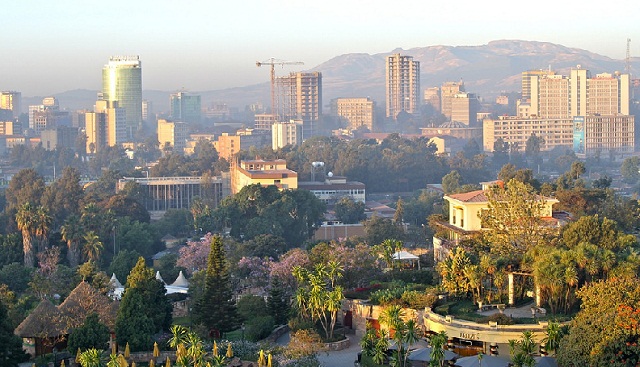
– Heritage, abandoned –
Government and private donors have successfully restored a handful of buildings, including one of Menelik’s palaces and the mansion of a former defence minister that’s been converted into a museum.
But city authorities acknowledge that most of the 440 buildings that have been designated heritage sites are rundown.
“Because of our capacity as a developing country, they can’t be repaired all the time,” said Worku Mengesha, a spokesman for Addis Ababa’s tourism office.
A decade ago, foreign embassies and Ethiopian preservationists tried to restore the Mohammadali house, once the property of a wealthy Indian businessman featuring prominent Indian and Arabian architectural elements in addition to its imperial-era Ethiopian style.
However, bureaucracy and shoddy construction scuppered the effort, Fasil said.
As a result, it is padlocked and abandoned, with parked cars sheltering beneath its Indian-inspired arches and a pair of discarded trousers draped across its faded cream staircase.
Other historic buildings continue in their Derg-era role of housing for the poor, or in their slow decrepitude.
The expansive former palace of Hojele Al-Hassen, a wealthy traditional ruler during the Menelik era, still houses people from his western region, who spend after-work hours socialising on the wraparound veranda.
But it’s increasingly dilapidated, with an entire decaying wing that once served as a school classroom sealed off for safety.
– Family history, city history –
Three years ago, as city authorities levelled the homes that had mushroomed around Berhanu’s house, he kept the bulldozers at bay by having his home designated an historic building.
Berhanu now hopes to turn his family history into national history.
Standing near a large portrait of the matriarch Yemtu, he spoke of his dream to make a museum of the house whose rooms are filled with family photographs and heirlooms, including a wall-spanning snake skin.
“This is not only our property. It belongs to all Ethiopians and people of Addis Ababa,” he said.
He hopes the city will agree.
Across the street in the slum area the government wants cleared, his neighbour Solomon Damana had recently resolved a dispute with city authorities and was following orders to demolish the small family home in which he was born and raised and move to a one-bedroom apartment on the outskirts of town.
“I’m happy that one isn’t demolished,” he said, gesturing at Berhanu’s place. “It’s an historic house.”
 The Independent Uganda: You get the Truth we Pay the Price
The Independent Uganda: You get the Truth we Pay the Price





